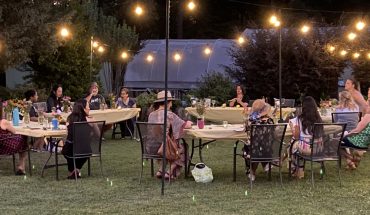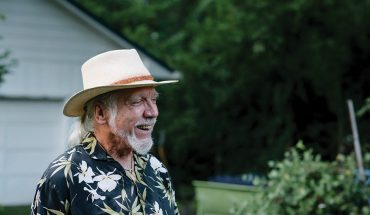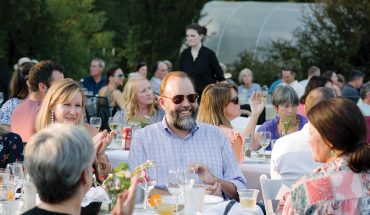The vegetarian food pioneer talks about the restaurant’s inception, sustainable agriculture and what’s next after selling his restaurant.
as told to Addie Ladner
Arthur Gordon is the original owner of Irregardless Cafe, which he sold (after 45 years) recently to Trophy Brewing co-founder, David Meeker. We spoke to him about the restaurant’s early days, the next chapter for him and his wife Anya, continuing their mission for healthy food and passion for local urban agriculture at their own urban oasis, the Well Fed Community Garden.
Tell me about the origins of Irregardless.
My grandparents moved here at the turn of the last century. My mother, Ruth, was born in Raleigh in 1917. Her first apartment was on Fayetteville Street, and then they moved to Oakwood. My family had businesses in the Triangle all my life. The family started with a small jewelry shop at the corner of Hargett and Wilmington (near Raleigh Times). When my grandfather passed away, my grandmother turned it into a dress shop. She, along with my aunt, ran it for 45 years. My parents, who met in New York City, opened a dress shop in Durham. As a teenager, I’d go to Raleigh and help my uncle Dan in his men’s shop, which was across the street from my aunt’s lady’s dress shop. The advantage of being a local was that I knew what was here and what’s not here.
When we first opened the Irregardless Cafe in 1975, most of the food service in Raleigh was cafeteria-style: Ballentines and K&W. These buffets were essentially salt or sugar-heavy menus and this was the entire food and social scene in Raleigh. There weren’t many restaurants or ethnic options except the Chinese place. Certainly, there were no vegetarian restaurants. I wanted the community to have a choice to enjoy food that would promote their good health.
Did you have any cooking experience?
When I was in college [at UNC-Chapel Hill], I started cooking for myself and friends. I applied to the Culinary Institute of America and wanted to train as a chef. They suggested that I should have at least a year of professional cooking experience, so I got together with two friends, found an old building and we opened the restaurant on a shoestring budget. Business took off like a rocket, and I never considered the CIA again. I learned to cook from people that I met that were good cooks. I would invite them into the Cafe kitchen, and they would show me how to cook dishes from their homelands, and also teach me their culinary techniques.
Did you cook a lot as a child and teenager? Was food a part of your life?
When my Mom and Dad married, my Mom said to my Dad: “I’m going to be good in one room, you pick it.” My dad didn’t pick the kitchen (the room was the dress shop) so I learned how to cook. My grandmother Lena would come from New York City and cook all day and fill the freezer with her old-world winning recipes for the family to enjoy until she returned.
Where’d the name of the restaurant come from?
My grandmother came from Russia to New York as a young woman. She never learned to read or write English, she just learned to speak English. So when Grandma Lena would use the word ‘irregardless,’ I’d say, “Grandma, don’t you know that ‘irregardless’ is not a word.” Her answer was “Did you understand what I meant?” and I said “Yes.” Then she would say that she wasn’t taking a test, and as long as I understood her, that was all she cared about. Since Grandma Lena showed me how to cook with love, I named the restaurant in her memory.
Now the restaurant prides itself on sourcing locally. How did you get fresh produce back in the day with fewer options for local food? Was it a challenge to be plant-based?
I’d go to the farmers market in Raleigh daily, and often I was the only chef there. I got to know lots of local farmers, and originally I would haggle with them to get the best prices possible. It finally dawned on me that I should always pay the farmer their price because they were the most important link in the food system. Whatever produce was local and available would determine the menu, which changed daily at the Cafe. At first, we only had four fresh entrees each day.
What’s one of your fondest memories of the restaurant’s early days?
The cafe generated lots of regular patrons who I now call great friends. The Irregardless was the first restaurant in Raleigh to serve Sunday brunch, and to this day it is still the most popular meal. I would come in early on Sunday and sit alone drinking a cup of coffee in the dining room before the staff arrived. At these moments, I would reflect and appreciate the community that we grew.
Irregardless has also had a great music scene. What have been some of your favorite musical memories there? Did you really have music every night since you opened in 1975?
Yes, we had performers every night of the week and Sunday Brunch, since the first day we opened in 1975. At first it was casual with friends on guitar playing for tips. This evolved to highlighting over 200 mostly local musicians performing on a 2-3 month rotation. Raleigh has excellent talent, truly incredible. I loved the musicians. Pee Wee Moore, an elderly African American gentleman, who retired to Raleigh and lived with his sister, played the saxophone with such jazz greats as Dizzy Gillespie and John Coltrane. On a Thursday night, which was not particularly busy, Pee Wee and Ed Moon on bass were playing for the dinner crowd. They performed with such verve and intentionality that the inside of the Cafe windows fogged up. It was a transformative evening. Live music has been a significant part of the Irregardless experience.
People are missing gatherings with friends over dinner and drinks now, and restaurant owners are experiencing a lot. Have you been reminiscing about any specific Irregardless gatherings that stand out in your mind?
Yes, our world is interrupted by this pandemic. In 1994, the Cafe had a serious fire, closing it down for 11 months. During that period, I paid my staff full wages if they would volunteer at a non-profit agency. This is such a good example of what is necessary today. If we can look past our immediate needs and help each other, the country will be stronger than ever.
Now there’s a whole scene of incredible farm-to-table and vegetable-forward restaurants here.
I joke that you can always tell the pioneers: they’re the ones lying on the side of the road with arrows on their back. Sourcing locally is very satisfying. What did grandma say to you? “Eat your vegetables.” And today the nutrition experts are telling us this, that 50% of our diet needs to be fruits and vegetables. We still know that to be true. That truth is eternal and it can manifest itself differently with each generation, we don’t need scientific reasoning for it.
Is there a favorite dish you served or that sticks out in your memory?
The one recipe that’s stood the test of the time is lemon tahini dressing.
That’s a hot food trend right now. When was that developed?
In 1975! I still have the recipe, it’s celery, peppers and onions, which we puree with lemon juice and slowly add to the tahini and soy sauce. It’s almost a salad itself.
You’ve always entertained large groups of people. What’s your cooking like nowadays?
What’s fascinating now that I’m cooking for Anya and me is that I don’t know how to cook for just two people! I cook for three meals: dinner, lunch the next day and also leftovers. I’ve also discovered you can’t make today’s meal today if you want to eat plant-based. You have to start preparing at least the day before, do it one-two days before, by pickling vegetables, soaking beans, slicing and salting eggplant and turning cabbage into sauerkraut. I find plant-based cooking fascinating. Sourcing locally and seasonally—whatever’s available—gets my creative juices flowing. We’ve enjoyed delicious meals during this pandemic.
Can you tell us about the new owners and their plans for Irregardless?
David Meeker is the son of good family friends. He has brought Lee Robinson in—a seasoned restaurant manager—and their goal is to keep Irregardless as the same local dining establishment for at least the next 20 years.
And so what’s next for you and Anya? (Anya now speaking)
We are continuing to support the local food scene and helping to manage the Well Fed Community Garden. Folks eat healthier diets when they witness food growing. Urban agriculture —as in, growing our food in the city—improves our health in many ways: Physically with exercise and fresh organic produce, emotionally by being in garden communities, spiritually by witnessing the miracle of nature: air, rain, soil, seeds, bugs and so much more. Tami Purdue of Sweet Peas Urban Gardens is the garden’s current manager. Tami is an urban farmer of microgreens and is welcoming folks into the garden to experience what it takes to grow food. She is also selling produce and offering a variety of agri-tourism events, as the pandemic and social distancing permits.
Tell us about the Well-Fed Garden. Where does the name come from?
We purchased 1321 Athens Drive in the spring of 2012 with five other families. Shortly after we surveyed the overgrown yard, we were surprised to discover an old well, a remnant of the land’s early days. The well gives the garden its name: ‘The Well Fed Garden’, nourishing the land which in turn nourishes us with food. The well has been re-dug and a modern irrigation system waters the entire garden.The garden’s founding garden manager, Jenn Sanford Johnson, worked tirelessly with devoted volunteers to transform this abandoned land into today’s Garden. Over her four years as garden manager, she implemented the charming permaculture plan designed by Will Hooker, a retired NC State professor of Sustainable Landscape Architecture, and his associate Laura Willer. Jenn’s intern Morgan Malone followed her and ably managed the garden for three years with her friends, adding many agri-tourism options that welcomed the community into the garden.
What’s the history of the property?
We are told that this property is one of the last remaining parcels of land that the Jones family farmed well into the mid- to late-20th century. Still living on adjacent properties are homes of family descendants Annie Belle, Pete and James Jones, who remember the corn and squash growing on the land that is now the Well Fed Community Garden.
How can Raleigh utilize the Well Fed Community Garden today?
Currently, the Garden welcomes volunteer gardeners and also produce customers and anyone is allowed to come walk around the front portion where there are lots of herbs and flowers for picking, a little library and a food pantry. As the pandemic eases (God willing) and our community can move about safely, we plan to host community agri-tourism events like Yoga in the Garden, cooking classes, farm dinners, date nights and children’s theater. This is our little way of making our society and community healthier. It’s such a benign way of making our lives better. When people can see where their food is growing, it’s healing.
To learn more about The Well Fed Community Garden now in collaboration with Sweet Peas Urban Garden click here.









